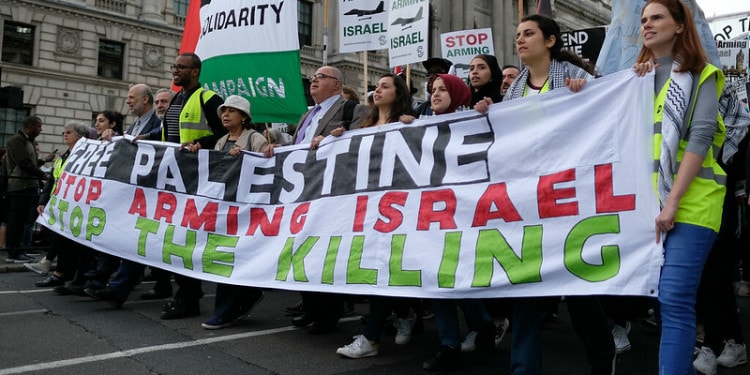The recent Palestine-Israel violence convinced more than half a million people in the UK to sign two petitions, firstly, requesting the Government to recognise Palestine as a state and secondly, to block all trade between the UK and Israel. Yet despite the public outcry, expressed not only through the petitions but also by way of the continued demonstrations nationwide, the final decision reached was there will neither be sanctions or boycotts and that the UK will still not recognise Palestine as a state until “a time when it best serves the object of peace”.
Whilst, not a surprising decision, it is nonetheless a disappointing one for Palestinians as well as for those in the UK who are trying to push for change. But it is also the vague or unanswered answers to the many rational points and legitimate questions made by academia, activists, international bodies and UK MP’s which is infuriating, particularly when we are witnessing such violence on the news and social media channels.
Such vague answers are also given at a time when trust for the UK government’s decisions in international and domestic policies is at an all-time low. At home, we are witnessing the government’s increasingly hostile policies, firstly, with the New Plan for Immigration, criticised for its misrepresentation of empirical evidence and potential to breach international law, and secondly, with the Police, Crime, Sentencing and Courts Bill, publicly denounced for its plans to curtail the rights to freedom of assembly and to speech.
Faith in the Government’s transparency and motivations when decision-making in international politics is also shaken and the conclusions of the Chilcot inquiry following the decision to invade Iraq are never far from the public’s consciousness, discovering that the decisions of the government were not well-thought-out, correct, based on truth, or legal. How does this relate to the matter at hand, considering the UK is now under a different government? Well, simply that it serves as a poignant reminder that the government can and does make illegal and poor decisions, under the guise of “knowing best,” ignoring the protests and rational arguments of academics, activists and concerned citizens.
For those disheartened by the efforts of the Iraq protests, read also Ian Taylor’s paper “Local press reporting of opposition to the 2003 Iraq War in the UK,” which considers how the media attached notions of “partial legitimacy” and “partial deviance” to opposition movements in the lead up to the decision to go to war. The positive taking from this is that we should not consider national movements to be ineffective. Indeed, the massive opposition to the Iraq war was still undermined by media narratives, even if not explicitly so. Let us hope our new methods of sharing information, even though flawed still, are more diverse, effective and independently driven than they were in 2003.
Of course, the UK is now operating under a new government, however, the damage has been done. This damage, too, has been consolidated rather than healed by the current government. Its recent policies show a propensity for a renewed political realist approach, with its merger of the Department for International Development and Foreign Office which sparked considerable criticism and concern; its increase in military spending, ranking as fifth largest military spender in 2020; and its increase in arms exports — selling weapons and defence equipment to countries considered “not free” by Freedom House, a respected international think-tank.
In respect to Israel, it is reported by Campaign Against Arms Trade that between 2016 and 2020, the UK issued single individual export licences for arms sales to Israel to a value of £400m — a significant increase from the £67m in licences from 2011 to 2015, despite promises in 2014 that all export licences would be reviewed.
Considering all this, I think those of us who raise our eyebrows can be excused when told that, “the Government takes their export control responsibilities very seriously, and operates one of the most robust arms export control regimes in the world.” Particularly when the government’s response still doesn’t address the issue at heart.
Why is the UK selling so many arms to the world? And as was raised in last week’s debate, why is it necessary that the British Government should continue selling £360 million worth of arms to Israel?
The issue of arms manufacturing and exporting is not just limited to Israel, of course, and whilst activists persist in their struggle to disrupt Israeli-owned arms manufacturers such as the 10 Elbit Systems’ factories in the UK, there are efforts to close down sites that are manufacturing and exporting arms to many other countries, including Saudia-Arabia, Hong-Kong and the US.
In November 2019, following a United Nations Security Council-mandated investigation which showed bomb-parts from a UK arms manufacturer at the site of Saudi-led coalition airstrikes on civilian targets in Yemen, outrage and concern was further generated, yet a written parliamentary question by local MP’s about the UN report went ignored.
https://www.youtube.com/watch?v=-MygOWLu6pc
In the case of Israel, the UK’s justification is Israel’s right to defence. Yet when probed further about the disproportionate violence used by Israel against Palestine, no satisfactory answer, or indeed answer at all, is given. Nor to requests raised by MP’s that the Government should look more closely at the deployment of arms to Israel, a request provoked by Israel’s excessive response. As Liberal Democrat MP, Alistair Carmichael, voiced,
“Like others, I bow to no one in my acceptance of Israel’s right to defend herself, but we all know that self-defence in law, wherever we find it, must always be commensurate, appropriate and proportionate, and what we saw was none of those things. The idea that these events were contributed to by arms sold from this country is something that many people, wherever they stand on the debate, find disturbing.”
Disturbing indeed, and it is little wonder that activists, such as Palestine Action, have ramped up their activity in order to force factory closures and disrupt exports.
During the debate, challenges and concerns were also raised regarding the government’s decision to not recognise Palestine as a state until that “time when it best serves the object of peace,” despite the fact that 138 out of the 193 member states of the United Nations have recognised the state of Palestine.
Asked by conservative MP Andrew Selous, “If not now, when?” Selous argued that recognition could be a spur to peace — a sentiment shared by others in the debate — and expressed concern about the consequences of late recognition, in light of the increased building of illegal settlements in the occupied territories.
Furthermore, the UK’s paradoxical stance in advocating for a two-state solution whilst delaying recognition was highlighted as a major problem. Members of the Parliament also pointed to the military occupation of the Palestinian territories (that were designated for a future state of Palestine), as the root cause of many of the issues at hand — asking whether the government would openly condemn illegal annexations and evictions.
On this specific matter, the Minister of State assured that “the UK position on evictions, demolitions and settlements is long-standing, public and has been communicated directly to the Government of Israel.” However, in response to recognizing Palestine as a state and the arguments for doing so, the Minister simply reiterated that “bilateral recognition in itself cannot, and will not, end the occupation.”
It was further concluded regarding the issue of sanctions and boycotts, that they were unhelpful to peace efforts and detrimental to the UK-Israeli relations, as well as to the UK’s influence in the Middle East.
It is true that sanctions, however justified and punitive, often do not have the desired effect and by and large, they affect the most vulnerable group in society and negatively impact movements for equality and sustainable development. Additionally, they produce a political backlash, with domestic support increasing for more extreme political parties who endorse those very policies that the sanctions seek to alter — an effect which was observed in a 2018 analysis of Israel. However, the paper did conclude that a comprehensive boycott imposed by a sender perceived as a key strategic ally could potentially enact behaviour change. Yet, according to the paper, this key ally is, of course, the United States — the UK gets no mention at all.
To be clear, it is the only concern of sanctions’ effectiveness and their potential effects on Palestinians and other vulnerable groups in Israel that holds me back from fully endorsing this method. On the matter of dealing in products produced in illegal settlements, potential backlash caused by banning or labelling them still does not change the fact that they are illegal by mandate of UN Security Council resolution 2334. As SNP member Alyn Smith argued, they should at the very least be labelled.
Whatever concerns I may hold about sanctions, I am frustrated by the UK’s transparent motivation for not enforcing them and am concerned about the message that this sends — that Israel may continue to operate with impunity. The fact is, the UK frequently employs the use of sanctions and claims that they are concerned about their potential to have negative effects on a “peace process,” which is non-existent are laughable. Considering the increase in arms sales to Israel, it is clear that the UK’s sole concern is its own strategic position in the Middle East.
Interestingly, the UK government is not only opposed to placing economic sanctions but has also played a role in trying to restrict support of the Palestinian call for Boycott Divestment and Sanctions (BDS). For example, in 2016 the Department for Communities and Local Government issued guidance that prohibited Local Government Pension Schemes (LGPS) from divesting contrary to UK foreign and defence policy, thereby limiting the possibility of divestment from companies involved in Israel’s human rights violations. This is an approach that has seen success in Scotland, now considered a “Bank Hapoalim-free zone.” Hapoalim is listed in the UN’s database of business enterprises involved in activities that impact the civil, political, economic, social and cultural rights of the Palestinian people throughout the Occupied Palestinian Territory, including East Jerusalem.
The matter eventually reached the UK Supreme Court, taken by the Palestine Solidarity Campaign (PSC), and in 2020, the regulations were declared illegal, the court confirming that the government had gone too far in imposing its political opinions onto the management of the money of LGPS members. This also serves as a reminder that the current government has been encroaching on how UK citizens choose to interact with Israel — and that this is illegal.
In conclusion, no compromises at all, the UK government is content to continue just so, the only concession being that the UK will provide £3.2 million of new aid to the United Nations Relief and Works Agency for Palestine Refugees (UNRWA). When put next to the figures shared by Campaign Against Arms Trade, it doesn’t seem like much of a concession at all.
EDITOR’S NOTE: The opinions expressed here by Impakter.com columnists are their own, not those of Impakter.com — In the Featured Photo: Palestine solidarity protesters march towards the British parliament. Featured Photo Credit: Alisdare Hickson/Flickr








